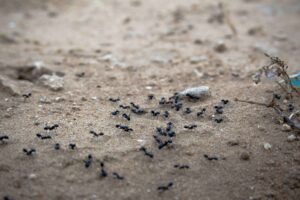 Surprisingly, bed bugs can be found almost anywhere nowadays, even in public libraries. Books can come back from a home infested with bed bugs, and those bed bugs may have hitched a ride from the home, meaning the bed bugs have now found their way into the library. It can seem that no place is safe from bed bugs. Thankfully, with quality, professional pest control, there are tried and true ways to get rid of bed bugs for good.
Surprisingly, bed bugs can be found almost anywhere nowadays, even in public libraries. Books can come back from a home infested with bed bugs, and those bed bugs may have hitched a ride from the home, meaning the bed bugs have now found their way into the library. It can seem that no place is safe from bed bugs. Thankfully, with quality, professional pest control, there are tried and true ways to get rid of bed bugs for good.
How Bed Bugs Find a Way into Libraries
There are many ways that bed bugs can find their way from homes into libraries. One way is on the clothing or shoes of patrons frequenting the library. If bed bugs are on clothing as people come in, they may jump off and find their way into the library itself to begin breeding. Other ways bed bugs can enter a library is via the books that were checked out and returned. Bugs will hide in the binding of returned books, which can, in turn, lead to a bug infestation. Bed bugs have even been found in DVDs or near computers in libraries as well. If you aren’t careful, the next step is that patrons that visit the library can bring home bed bugs from the library, thus beginning an infestation in their home, and the cycle continues.
How To Spot a Bed Bug Infestation
Libraries and other public places are large spaces, which can make it hard to notice an infestation when it begins. In a library, the top spots to find bed bugs are in or around the seams of chairs, behind wall hangings, or on the floor, particularly near lights or lamps. Other signs of bed bugs may be brown droppings, tiny white eggs, or blood spots. If any patrons complain of itchy red bites, this is a sure sign there is a bed bug problem lurking in the library. Once an infestation has taken hold, it can be difficult to get rid of. Thankfully, there are ways with pest prevention to address bed bug infestations.
Pest Control for Bed Bugs
Once you notice a problem, it is important to reach out to the experts right away. No DIY method for getting rid of bed bugs in large public places is likely to work. Pest control experts are trained and equipped to deal with these situations with expertise. In Georgia, Pest Force offers proven bed bug control services such as K-9 detection and heat treatment. With K-9 detection, trained animals will smell out infestations and pinpoint problem areas. Then, libraries can be heat treated to get rid of bed bugs and their eggs once and for all, as they can’t survive in high temperatures.
If you suspect a bed bug infestation in your local library, be sure to reach out to the experts. With the right tools and plan in place, Pest Force can take care of bed bug infestation so your library can be pest free.
Frequently Asked Questions About Bed Bugs
When Do Bed Bugs Bite?
Bed bugs are mostly active at night and will bite while you are sleeping. Their long beaks will pierce your skin and take your blood. They come out when they sense the carbon dioxide being released during your rest. Most bed bugs feed anywhere from 3 to 10 minutes, or until they are full, and then they crawl away back into their small spaces where they are hard to see. After bed bugs have bitten you, you may notice a red, itchy spot on your skin.
Where Do Bed Bugs Lay Their Eggs?
Because bed bugs often feed on humans who are sleeping, most bed bugs will lay their eggs either on or near beds. They like to lay eggs on a mattress, either in seams or in joints. It can also be common to find bed bugs and eggs on the box spring or even behind headboards. Anywhere on or near the bed where a bed bug usually lives is where you can find their eggs.
How Can I Treat Bed Bug Bites?
The first step to treating bed bug bites is to wash them with soap and water. This will help reduce the itchiness and chance of infection. Then, you can apply a corticosteroid cream to help with the itch. Some calming lotions can also help. The best thing you can do is treat the itching sensation and wait for the spots to disappear on their own over time.



